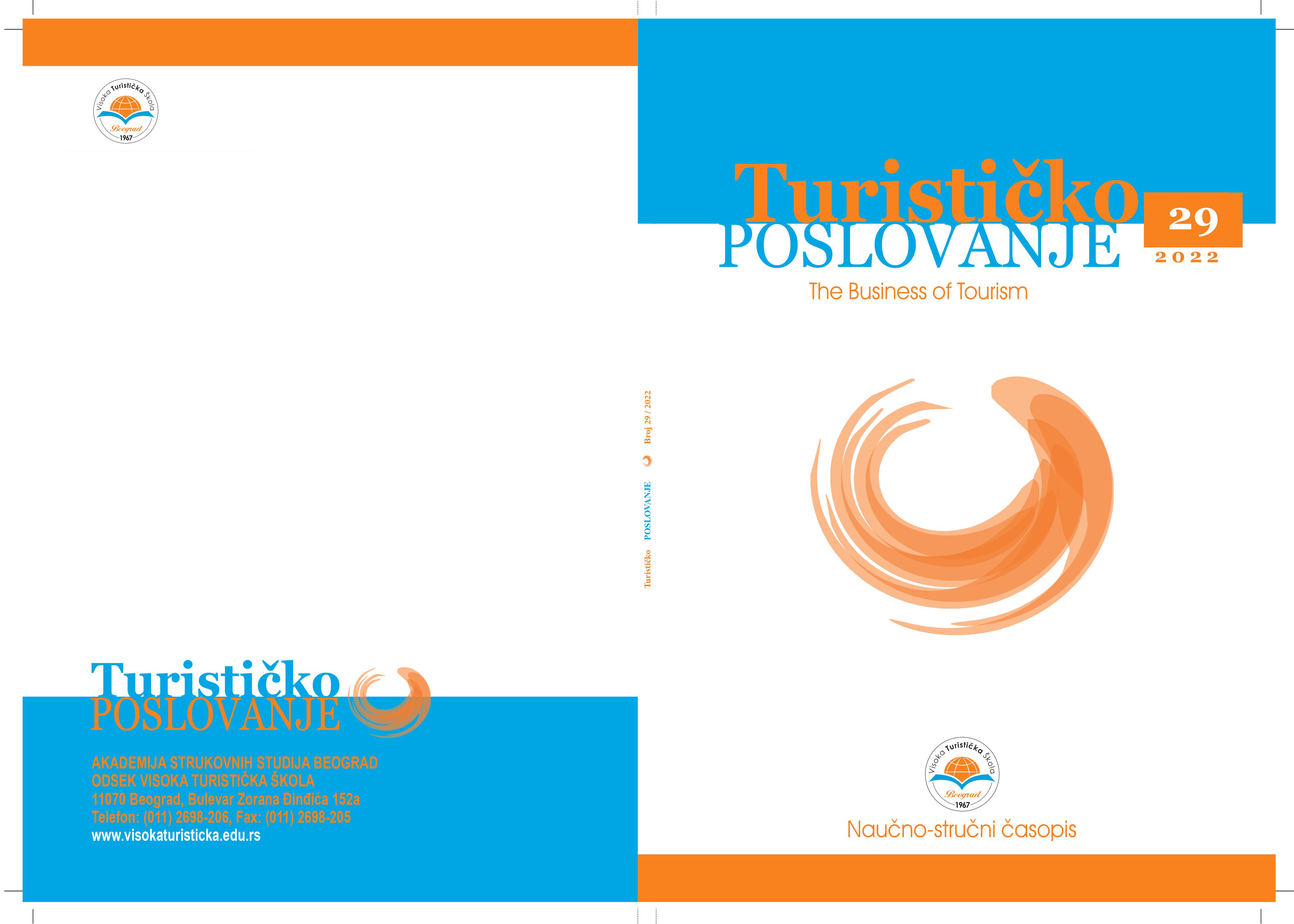IZAZOVI I PRIMENA KRIPTOVALUTA U TURIZMU
Sažetak
U radu će biti prikazano ispitivanje stavova i mišljenja učesnika na turističkom tržištu Republike Srbije o kriptovalutama i njihovoj spremnosti da ih prihvate u svom radu, biznisu i putovanju. Metode koje su korišćenje u radu: hipotetičko-deduktivna, strukturirana (zatvorenog tipa) pitanja, dihotomna pitanja sa jednim izborom; nominalne i intervalne merne skale. Istraživanje bi trebalo doprineti boljem razumevanju funkcionisanja digitalnih valuta u turističkom sektoru i bližem razumevanju izazova i izgleda za njihovu primenu. Sprovedena anketa je pokazala da su ispitanici upoznati sa blokčejn tehnologijom i kriptovalutama, ali ih uglavnom ne koriste ali imaju pozitivan stav prema hotelima i restoranima koji ih prihvataju.
Reference
Alaeddin, O., & Altounjy, R. (2018). Trust, technology awareness and satisfaction effect into the intention to use cryptocurrency among generation Z in Malaysia. International Journal of Engineering & Technology, 7(4.29), 8-10.
Bohr, J., & Bashir, M. (2014). Who uses bitcoin? an exploration of the bitcoin community. In 2014 Twelfth Annual International Conference on Privacy, Security and Trust (pp.94-101). IEEE.
Bonneau, J., Miller, A., Clark, J., Narayanan, A., Kroll, A.J., Felten, W.A. (2015) Research Perspectives and Challenges for Bitcoin and Cryptocurrencies. IEEE Xplore Digital Library. Retrived January 7, 2022 from: https://ieeexplore.ieee.org/abstract/document/7163021.
Chaum, D. (1982). Blind signatures for untraceable payments. Department of Computer Science, University of California, Santa Barbara.
Chuen, D. L. K., Guo, L., & Wang, Y. (2017). Cryptocurrency: A new investment opportunity?. The Journal of Alternative Investments, 20(3), 16-40.
Chuen, D., Kuo, L. (2015). Handbook of digital currency, Elsevier, Amsterdam.
Corbet, S., Cumming, J.D., Lucey, M.B., Peat, M. & Vigne, A.S. (2019) The destabilising effects of cryptocurrency cybercriminality. Economic Letters. Retrived February 9, 2022 from: https://doi.org/10.1016/j.econlet.2019.108741.
Dogru, T., Mody, M., Leonardi, C. (2018) Blockchain Technology & its Implications for the Hospitality Industry, Boston University School of Hospitality Adiministration, Boston.
Erceg, A., Damoska Sekuloska, J., & Kelić, I. (2020, March). Blockchain in the Tourism Industry—A Review of the Situation in Croatia and Macedonia. In Informatics (Vol. 7, No. 1, p. 5). Multidisciplinary Digital Publishing Institute.
Hileman, G., & Rauchs, M. (2017). Global cryptocurrency benchmarking study. Cambridge Centre for Alternative Finance, 33, 33-113. Retrived January 3, 2022 from: https://www.livingroomofsatoshi.com/graphs.
Jani, S. (2018). The Growth of Cryptocurrency in India: Its Challenges & Potential Impacts on Legislation. Research gate publication.
Kyrmizoglou, P., & Daoultzoglou, A. (2019). Evolution of payment methods in Greece–Determinants of their use. Central European Review of Economics & Finance, 31(3), 5-16.
Leung, D., & Dickinger, A. (2017). Use of bitcoin in online travel product shopping: the European perspective. In Information and communication technologies in tourism 2017 (pp. 741-754). Springer, Cham.
Lielacher, A. (2018). Cryptocurrency complaints to Consumer Protection Agencies way up. Brave New Coin. https://bravenewcoin.com/insights/cryptocurrency-complaints-to-consumer-protection-agencies-way-up. Retrived June 3, 2021.
Liu, Y., & Tsyvinski, A. (2021). Risks and returns of cryptocurrency. The Review of Financial Studies, 34(6), 2689-2727.
Marić, D., Leković, K., & Tomić, S. (2021). Slow tourism consumers’recommendations. TEME, 1429-1440.
Matanović, A. (2016) Bitcoin Adoption in Serbia, Current Situation and Future Potential, University of Nicosia, Cyprus.
Matheus, W. (2019) Read Our Exclusive Interview with Mr. Zurab Pololikashvili, Secretary-General of the World Tourism Organization (UNWTO). Cryptonewsworld.
Nuryyev, G., Wang, Y. P., Achyldurdyyeva, J., Jaw, B. S., Yeh, Y. S., Lin, H. T., & Wu, L. F. (2020). Blockchain technology adoption behavior and sustainability of the business in tourism and hospitality SMEs: An empirical study. Sustainability, 12(3), 1256.
Önder, I., & Treiblmaier, H. (2018). Blockchain and tourism: Three research propositions. Annals of Tourim Research. Retrived April 4, 2022 from: https://doi.org/10.1016/j.annals.2018.03.005.
Rose, N. (2016) Will Blockchain Disrupt Travel Distribution and Settlement. Phocuswright. Retrived February 4, 2022 from: https://www.phocuswright.com/TravelResearch/Technology-Innovation/Will-Blockchain Disrupt-Travel-Distribution-and Settlement.
Şimşek, H. (2019). Development of crypto money: The case of turkey. Economic growth public finance & game theory, 123.
Su, J. (2019). Hackers Stole Over $4 Billion From Crypto Crimes In 2019 So Far, Up From $1.7 Billion In All Of 2018. Forbes.
Tapscott, D., Tapscott, A. (2016) Blockchain revolution: how the technology behind bitcoin is changing money, business, and the world, Penguin Books Limited.
Tasatanattakool, P., & Techapanupreeda, C. (2018). Blockchain: Challenges and applications. In 2018 International Conference on Information Networking (ICOIN) (pp. 473-475). IEEE.
Treiblmaier, H. (2020). Toward more rigorous blockchain research: Recommendations for writing blockchain case studies. In Blockchain and Distributed Ledger Technology Use Cases (pp. 1-31). Springer, Cham.
Yussof, S. A., & Al-Harthy, A. M. H. (2018). Cryptocurrency as an alternative currency in Malaysia: issues and challenges. ICR Journal, 9(1), 48-65.
Zhang, X. (2020). Opportunities, Challenges and Promotion Countermeasures of Central Bank Digital Currency. In 2020 Management Science Informatization and Economic Innovation Development Conference (MSIEID) (pp. 343-346). IEEE.
Živković, R., Brdar, I. (2018) Ponašanje i zaštita potrošača u turizmu, prvo izdanje, Univerzitet Singidunum, Beograd.
Zou, C.C. & Rezaeighaleh, H. (2019). New Secure Approach to Backup Cryptocurrency Wallets. University of Central Florida. Retrived March 5, 2022 from: https://www.cs.ucf.edu/~rezaei/papers/Globecom-2019.pdf.

